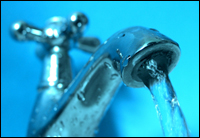Two years ago, Mason Perez, then seven, went to wash deposits of ballpark ketchup and relish off his hands and face. The water in the Reno Aces ballpark poured out the faucet so hard and fast that it hurt his hands.
His mom turned down the faucet, and that's when Perez had a brilliant, simple realization: Turning down a faucet valve means less water pressure, which means less water. You can save water just by making it not spurt out so fast. He tested this theory for a science project at residential and commercial sites and found that, yep, turning down valves meant less water flowed out of the buildings’ pipes.
When a building first goes up, water valves should be wide open, to clear out dirt and air left over from construction. But after that, there's no need to keep them so loose. Tighten a pipe's valve, and you'll start saving gallons of water and buckets of cash.
The ballpark where Perez first had his inspiration took his advice and turned down the pressure. Have another hot dog, Perez; you’ve officially peaked at 9 years old, but at least you saved your local ball park 20 percent in water costs (and avoided a whole lot of wasted water).




